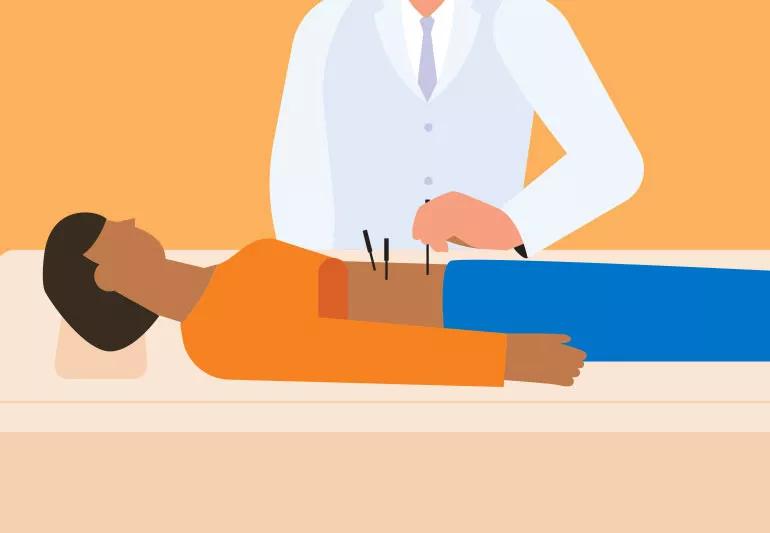It’s great for stress relief, which can go a long way when you’re trying to conceive

Image content: This image is available to view online.
View image online (https://assets.clevelandclinic.org/transform/ecd8a271-250f-413e-863d-16451bb2e95e/doc-Patient-Accupuncture-1443470804-770x533-1_jpg)
Person lying on exam table gets accupuncture from doctor to help in conception.
If you’re trying to get pregnant, you may be doing everything in your power to make it happen: You’ve stopped your birth control, you’re preparing your body and you’ve begun tracking your menstrual cycles. You might have begun fertility treatments.
Advertisement
Cleveland Clinic is a non-profit academic medical center. Advertising on our site helps support our mission. We do not endorse non-Cleveland Clinic products or services. Policy
And you may even turn to complementary methods like acupuncture, a natural practice that’s thousands of years old.
“It can be a real struggle to not be able to achieve pregnancy when you want to,” says reproductive endocrinologist Jenna Rehmer, MD. “Oftentimes, people who want to conceive look into anything they can that might help them achieve that goal.”
Dr. Rehmer and licensed acupuncturist Megan Scott, LAC, explain whether (and how) acupuncture may help you when you’re trying to get pregnant.
You may have heard that acupuncture is the must-do that will help you finally get pregnant. But the science is ongoing and conflicting. Some studies say acupuncture can improve sperm quality and ovarian function, but no conclusive evidence shows that acupuncture can treat infertility or help you conceive.
“The literature looking at different ways to achieve fertility is vast,” Dr. Rehmer notes, “but the data are just not currently really supportive of these alternative methods.” In one study of women undergoing in vitro fertilization (IVF), for example, acupuncture “resulted in no significant difference in live birth rates.”
But anecdotally, many people swear by the benefits of acupuncture when they’re trying to conceive. Licensed acupuncturists often work with people who are hoping to get pregnant — both individuals and couples alike.
Advertisement
“Patients seek acupuncture at all stages of attempting to conceive, including soon after discontinuing birth control; after months and months of trying with no success; and when seeking support after failed IVF attempts,” Scott says. “Acupuncturists can be of support to patients wherever they are in their fertility journey.”
In short, yes. Acupuncture is a common, widespread and ancient practice that’s considered overwhelmingly safe and can be performed alongside nearly all conventional therapeutics.
In traditional Chinese medicine, acupuncture is thought to help balance qi (pronounced “chi”), an energy force that’s believed to flow through pathways in the body called meridians. Your acupuncturist inserts fine, sterile steel needles into your skin at multiple “acupoints” to prompt your body’s healing response. In the case of acupuncture for fertility, these acupoints are often in your abdomen, targeting your reproductive organs.
Scott says the benefits of acupuncture for fertility may include:
If you’re interested in acupuncture, check with your primary care physician, Ob/Gyn or reproductive endocrinologist/fertility specialist to be sure it’s OK for you to try.
There’s one significant benefit to undergoing acupuncture when you’re trying to get pregnant: stress relief. Acupuncture has been shown to be a helpful way to relieve stress — and people who are experiencing infertility may have a lot of it.
In fact, one study found that women who have an infertility diagnosis have the same levels of stress as those with a diagnosis of breast cancer.
“The emotional and mental stress of infertility and its treatment is difficult to bear,” Scott says. “Acupuncture can be an incredible tool for relieving stress and providing comfort.”
Dr. Rehmer concurs: “I always tell my patients: If you’re in a place in your life where you feel a significant burden of stress and anxiety, and then you find a safe method of reducing that burden of stress, go for it.”
Most fertility specialists recommend making an appointment with them if you’ve tried unsuccessfully to conceive for six months to a year. But you can start seeing an acupuncturist long before then.
Many acupuncturists suggest coming in a few months before you hope to conceive, whether naturally or through IVF or IUI (intrauterine insemination), so they can assess your bodily response throughout a few menstrual cycles.
Advertisement
“We’ll do a thorough review of your health and reproductive history and create a plan that best supports you,” Scott explains. “A recommendation of weekly acupuncture is common when managing infertility, but your plan will depend on your needs.”
Advertisement

Sign up for our Health Essentials emails for expert guidance on nutrition, fitness, sleep, skin care and more.
Learn more about our editorial process.
Advertisement
You may be surprised to learn that acupuncture usually doesn’t feel like anything — and any discomfort is typically brief
This technique, rooted in traditional Chinese medicine, may help relieve muscle pain and lessen facial puffiness
This evidence-based practice is used to help manage pain, relieve menopause symptoms and boost your spirits
This ancient treatment is often a complement to acupuncture
Discover the benefits of this ear acupuncture technique
New government advisory recommends non-addictive options first
When you’re living with this chronic condition, early diagnosis and treatment can improve your chances of getting pregnant down the road
These over-the-counter kits are 99% effective at identifying when you’re most fertile each month
Prioritize your health by managing stress, strengthening your social connections and getting quality sleep
Bolsters, blankets, pillows and blocks can offer extra support, stability and comfort
Allergies, postnasal drip, asthma or reflux could be to blame for a cough that won’t quit